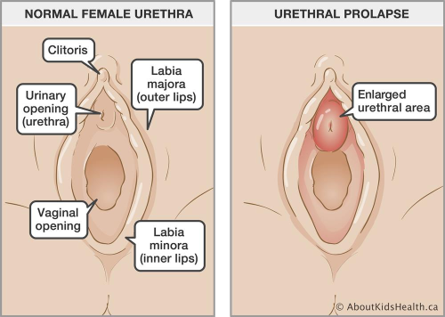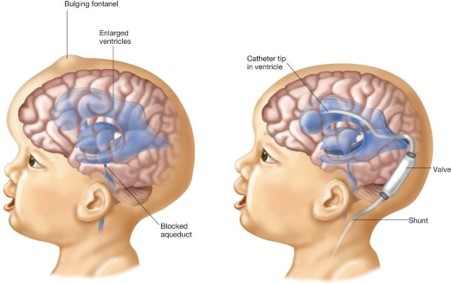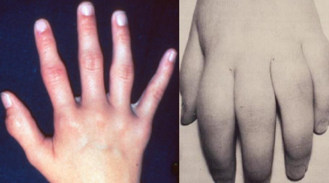Which factor predisposes the urinary tract to infection?
Prostatic secretions in males
Short urethra in young girls
Frequent emptying of the bladder
increased fluid intake
The Correct Answer is B
The anatomy of the urinary tract can influence the susceptibility to urinary tract infections (UTIs). In the case of young girls, their urethra is shorter compared to adult females, which increases the likelihood of bacteria reaching the bladder. The shorter urethra provides a shorter distance for bacteria to travel from the outside of the body to the bladder, making it easier for bacteria to enter and cause an infection.
Prostatic secretions in males in (option A) is incorrect because they are not directly related to the increased susceptibility to UTIs. Prostatic secretions can, however, contribute to conditions like prostatitis, which is an inflammation of the prostate gland that can be associated with urinary symptoms and sometimes bacterial infections.
Frequent emptying of the bladder in (option C) is incorrect because it is generally considered a healthy practice as it helps to flush out any potential bacteria in the urinary tract. It does not predispose the urinary tract to infection.
Increased fluid intake in (option D) is incorrect because it is generally encouraged to maintain proper hydration and urinary tract health. It can help to flush out bacteria from the urinary system, reducing the risk of infection.
While these factors may have implications for urinary tract health, the specific factor that predisposes the urinary tract to infection, particularly in young girls, is the short urethra (B).

Nursing Test Bank
Naxlex Comprehensive Predictor Exams
Related Questions
Correct Answer is C
Explanation
Hydrocephalus refers to a condition characterized by an abnormal accumulation ofcerebrospinal fluid (CSF) within the ventricles of the brain. In infants, hydrocephalus cancause the head to enlarge rapidly as a result of the increased pressure exerted by theaccumulatingfluid.Thisisknownas"rapidheadgrowth."Theincreasedintracranialpressurecanlead to irritabilityand poorappetite in infants.
The distended scalp veins are another common sign of hydrocephalus. As the fluidaccumulates,itputs pressureon thebloodvessels inthe brain,causingtheveinsin thescalptobecome morevisible and distended.
Cerebral palsy in (option A) is incorrect because is a neurological disorder that affects bodymovementandmusclecoordination,butitdoesnottypicallypresentwithrapid headgrowthordistended scalp veins.
Syndrome of inappropriate antidiuretic hormone (SIADH) in (option B) is incorrect becauseitisacondition characterized byexcessivesecretionofantidiuretichormone,leadingtofluidimbalance, but it does not usually cause rapid head growth or distended scalp veins. Reye'ssyndrome (D) is a rare condition that primarily affects the liver and brain, and it does nottypicallypresent with rapid headgrowthor distended scalp veins.
Therefore, based on the signs described, hydrocephalus (C) is the most likely disorder in thiscase.Itisimportantto seekmedicalattentionpromptlyforaproperdiagnosisand appropriatemanagementofhydrocephalus in infants.

Correct Answer is B
Explanation
Juvenile arthritis should be suspected in a child who exhibits joint swelling and pain lasting
longer than 6 weeks. Juvenile arthritis refers to a group of chronic inflammatory conditions
that affect the joints in children and adolescents. Persistent joint swelling and pain are
common symptoms of juvenile arthritis and are often accompanied by other signs such as
morning stiffness, limited range of motion, and joint warmth.
, frequent fractures in (option A) is not correct because it, is not typically associated with
juvenile arthritis. Fractures are more commonly associated with conditions affecting bone
strength, such as osteoporosis or certain genetic disorders.
lurching and abnormal gait with limited abduction in (option A) is not correct because it,
may be seen in certain musculoskeletal conditions or hip joint abnormalities, but it is not
specific to juvenile arthritis.
increased joint mobility in (option D) is incorrect because it, is not typically associated with
juvenile arthritis. In fact, joint stiffness and limited range of motion are more characteristic of
this condition.
Whether you are a student looking to ace your exams or a practicing nurse seeking to enhance your expertise , our nursing education contents will empower you with the confidence and competence to make a difference in the lives of patients and become a respected leader in the healthcare field.
Visit Naxlex, invest in your future and unlock endless possibilities with our unparalleled nursing education contents today
Report Wrong Answer on the Current Question
Do you disagree with the answer? If yes, what is your expected answer? Explain.
Kindly be descriptive with the issue you are facing.

